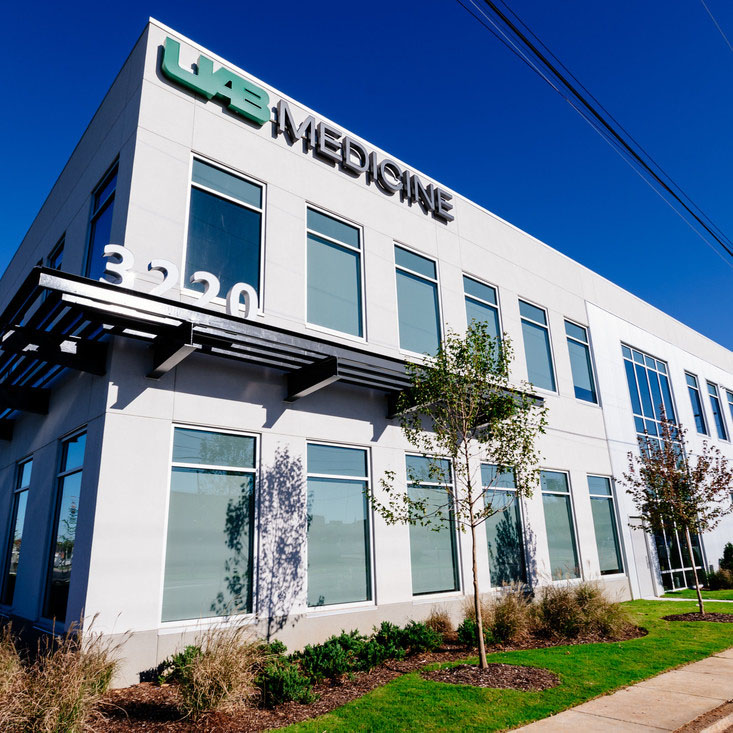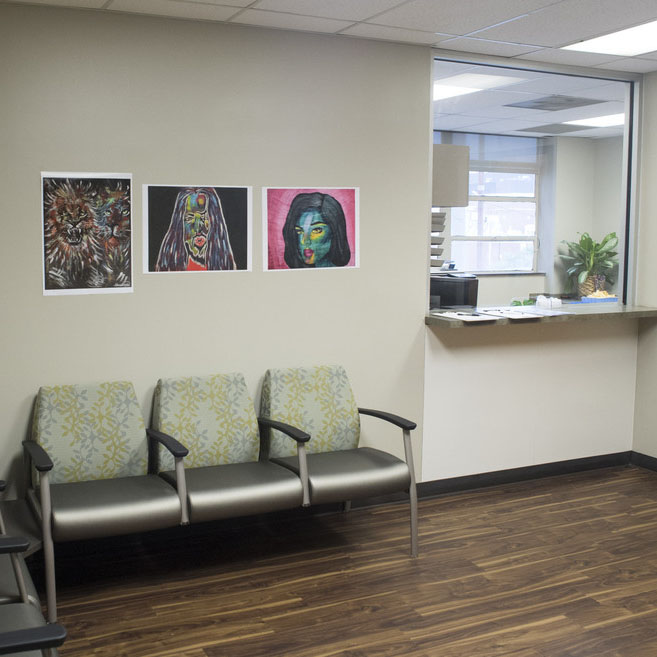 Contributing author: Valerie Powell
Contributing author: Valerie Powell
Department of Psychiatry and Behavioral Neurobiology
After a year of uncertainty and change, the security of feeling protected, provided for, and unified is more important than ever. As we celebrate another Pride Month at UAB during June, it is vital to ensure our LGBTQ+ employees, students, and patients feel these sentiments in their everyday lives.
Last week, we discussed a few of the LGBTQ+ employee and student organizations, initiatives, and programs on campus and at UAB Medicine.
Today, we are highlighting a sample of LGBTQ+ confirming patient care.
LGBTQ+ Mental Health and Wellness Clinic
The LGBTQ+ Mental Health and Wellness Clinic operates as part of the Department of Psychiatry and Neurobiology to provide safe, supportive, and affirming outpatient care to the Birmingham LGBTQ+ community and surrounding areas. The clinic is staffed with clinicians and providers who are specifically trained by field experts from organizations like Magic City Acceptance Center and PFLAG Birmingham, and who are committed to providing a variety of psychopharmacologic services. These services include outpatient services such as assessments of substance abuse disorders, trauma-informed therapy services, hormone affirming therapy readiness referral letters, cognitive behavioral therapy for ADHD, general anxiety and depression treatment, sleep behavior disorders care, and more.
While clinical health and wellness is a priority, the Department of Psychiatry and Neurobiology also strives to spread awareness of the unique needs of the LGBTQ+ community, while making culturally-sensitive trainings and educational tools accessible to health care professionals.
UAB Student Health & Wellness: Sexual Health Clinic & Gender Affirmation Services
The UAB Student Health and Wellness Sexual Health Clinic, directed by Nicholas Van Wagoner, M.D., Ph.D., associate dean for Students and associate professor in the Division of Infectious Diseases, provides resources and care for the sexual and gender health needs of all students. The clinic offers expertise in LGBTQ+ health care including gender transition services.
The clinic opened its doors in 2015 as a collaboration between the Department of Family and Community Medicine and the Division of Infectious Diseases in the Department of Medicine. A major goal of the clinic is to create a safe, supportive space for LGBTQ+ students to access and receive the health care they deserve. Student Health and Wellness, the Sexual Health Clinic, and Student Counseling work closely together to provide comprehensive care to LGBTQ+ students.
Gender Health Clinic
In the middle of the coronavirus pandemic, a small team of experts opened the doors to the new Gender Health Clinic at UAB, made possible through grant funding acquired by J. Patrick Selph, M.D., assistant professor in the Department of Urology, Amy Warriner, M.D., professor in the Department of Medicine, and Olivia Van Gerwen, M.D., MPH, clinical instructor in the Division of Infectious Diseases. The multi-disciplinary clinic began treating patients in July 2020 with only four patients. Now, in less than a year’s time, the clinic has over 120 patients and is the only comprehensive gender center in the southeast region.
Brianna Patterson, MPH, program director at the Gender Health Clinic and Ph.D. candidate in the College of Arts and Sciences Department of Sociology, serves as a patient navigator, community outreach liaison, and administrative professional at the clinic. “Most patients are scared to even get out of the car,” she explains. “I try to help them feel safe and protected from their very first visit.”
Patterson says 40-46% of patients at the Gender Health Clinic have never sought medical care due to regional stigma and discrimination. The clinic offers health care to one of the most vulnerable, disproportionately affected populations in the country—41% of which suffer suicide ideation at some point in their lives.
The clinic is staffed with a variety of experts from the disciplines of plastic surgery, urology, endocrinology, otolaryngology, and psychiatry. Transgender and non-binary patients are offered mental health services, vocal and speech therapy, and a roadmap for navigating their journey. In addition, it is the only clinic in Alabama, and one of a very select few in the southeast, to offer genital gender affirmation surgery, and is the only one of a few to offer hormone replacement therapy.
Van Gerwen says one future goal is to expand to a permanent location as the clinic continues to grow in size. “We offer the most comprehensive gender health care in the region and we wish to be a resource for LGBTQ+ patients in the Birmingham metropolitan area and throughout the Southeast,” she says. Van Gerwen explains the clinic aspires to offer more primary care options and partner with the Birmingham community at-large to bring visibility and quality health care to LGBTQ+ individuals in our area.
 1917 Clinic1917 Clinic
1917 Clinic1917 Clinic
Serving all of central Alabama, the 1917 Clinic is the largest HIV clinic in Alabama, and offers primary health care for people with HIV and a prevention clinic for those at-risk for HIV. Seeing eight to ten new cases of HIV per week, the clinic provides cutting-edge treatment and social support to those living with HIV.
James Raper, CRNP, Ph.D., J.D., FAAN, FAANP, FIDSA, professor of Medicine and Nursing, directs the 1917 Clinic. He says, “We serve patients from all over the southeast, but our designated service area is Jefferson County and the six counties contiguous to Jefferson County.”
When patients visit the clinic and have been newly diagnosed with HIV, they can be put on the “fast track” to beginning HIV medication on the same day. The clinic offers comprehensive care to patients. In addition to the medical providers, the clinic is staffed with 14 full-time medical social workers, four registered dieticians, a substance abuse therapist, and mental health counselors. The clinic supports $750,000 annually for nutrition and food services. Plus, the clinic has a contract with AIDS Alabama and Alethia House that secures almost $2 million in funding for housing.
Raper explains that the clinic provides care across the lifespan of patients—from late adolescence to geriatric care. The youngest patients are around 17 years old and the oldest patients are 90 years old.
Raper says one of his favorite moments as director was in 2012, when the community came together. The Jefferson County Commission went bankrupt and Cooper Green (CG) Mercy Hospital was required to close its doors. At that time, 700+ patients were receiving HIV care at St. George’s Clinic at CG. UAB and the staff of 1917 Clinic stepped in, and worked closely with administration of St. George’s to facilitate a transfer of all 700+ patients to 1917. “It was a miracle,” Raper reminisces. “Two organizations working hand-in-hand to ensure patients were not left without services. Of all the things I have done, it was my proudest moment.” The 1917 Clinic was also fortunate to be able to employ many of those from St. George’s who would have been left without employment—including Jane Mobley, M.D., who was the medical director at St. George’s and now works at UAB as a hospitalist and at 1917 Clinic every Thursday.
“The services here are impeccable,” Raper says. “I am proud of what we are able to do for so many.”
1917 Clinic first opened in January 1988. It was named “1917 Clinic” since its original location was 1917 5th Ave. South which was previously an OB/GYN clinic.
Sexual Health Research Clinic
Housed by the Division of Infectious Diseases, the Sexual Health Research Clinic helps UAB researchers continue to advance their work in the area of sexually transmitted infections and sexual health. The clinic originated with the intention to fill a long-standing gap in offering opportunities for women—and anyone who may not feel comfortable receiving health care in traditional health venues. STD clinic services have historically been geared towards men, and women and sexual minorities have previously reported feeling unwelcome in traditional health care settings. Because of the discrimination or bias from providers, sexual minorities have often been ashamed to seek care.
“At the clinic, we want to de-stigmatize sexual health. We aim to normalize sexual health,” says Jeanne Marrazzo, M.D., MPH, C. Glenn Cobbs, M.D., Endowed Professor in Infectious Diseases. “It’s important to me that the clinic is interdisciplinary, and for patients to feel like their health comes first. The Sexual Health Clinic at UAB gives us the infrastructure to do that.”
 Sexual Health Research ClinicThe goal in creating the Sexual Health Research Clinic was to offer a safe venue with cutting-edge research for all.
Sexual Health Research ClinicThe goal in creating the Sexual Health Research Clinic was to offer a safe venue with cutting-edge research for all.
Most patients in the clinic are women from the southeast region. Diagnostic studies seek to understand, diagnose, and treat bacterial vaginosis, gonorrhea, chlamydia, and more. Women enrolled in studies receive free care by participating, and are reimbursed for their time. They also receive free STI testing.
The clinic currently serves as a biomedical research clinic, and hopes to extend services to bridge behavioral services gaps in the future. Long-term, research at the clinic will change the course of how providers treat and understand sexual health.
LGBTQ+ designation for provider profiles
One of the biggest causes of health disparities among the LGBTQ+ population is discrimination in health care and fear of discrimination. Individuals across the southeast face weighty bias and discrimination in the south. UAB Medicine and UAB Learning System have teamed up to provide LGBTQ+ health designations for providers to showcase in their profiles.
To display the designation, physicians are required to enroll and complete two courses in the LMS, which trains them on cultural competency in working with LGBTQ+ patients. The LMS modules also provide an introduction to specific health concerns and issues in this vulnerable population.
Show your support
As an employee, trainee, or student of the School of Medicine, several options for allyship exist. One way to show your support is to download these new gender pronoun email signatures. Asking and correctly using someone’s gender pronouns shows respect and validation. Plus, it normalizes our unique identities and breaks through stigmas related to gender.